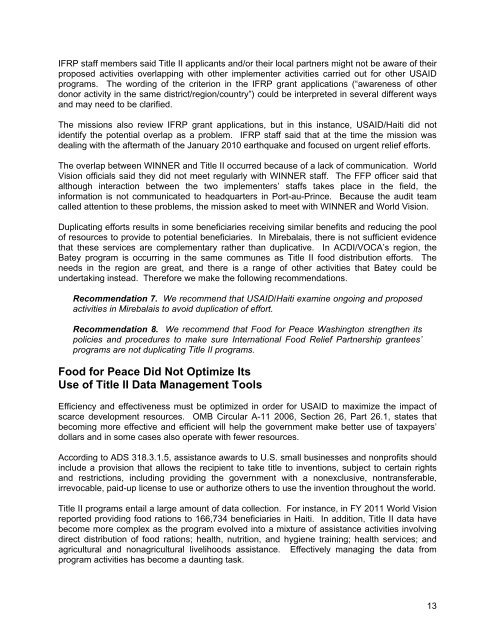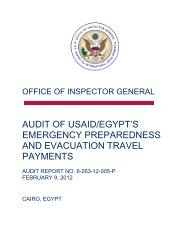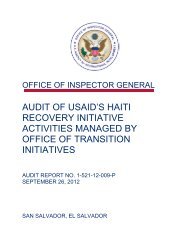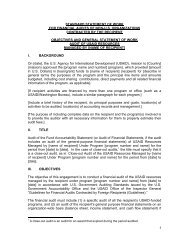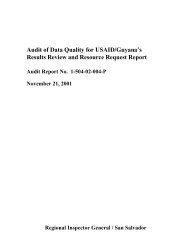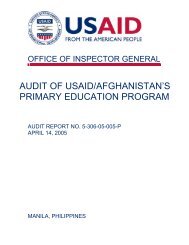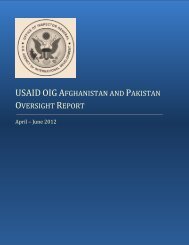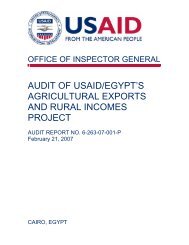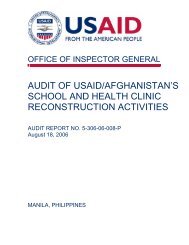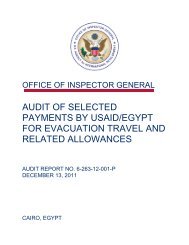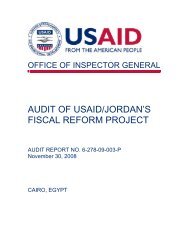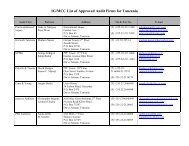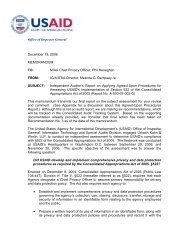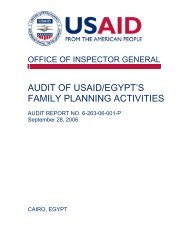Audit of USAID/Haiti's Public Law 480 Title II Programs
Audit of USAID/Haiti's Public Law 480 Title II Programs
Audit of USAID/Haiti's Public Law 480 Title II Programs
Create successful ePaper yourself
Turn your PDF publications into a flip-book with our unique Google optimized e-Paper software.
IFRP staff members said <strong>Title</strong> <strong>II</strong> applicants and/or their local partners might not be aware <strong>of</strong> theirproposed activities overlapping with other implementer activities carried out for other <strong>USAID</strong>programs. The wording <strong>of</strong> the criterion in the IFRP grant applications (“awareness <strong>of</strong> otherdonor activity in the same district/region/country”) could be interpreted in several different waysand may need to be clarified.The missions also review IFRP grant applications, but in this instance, <strong>USAID</strong>/Haiti did notidentify the potential overlap as a problem. IFRP staff said that at the time the mission wasdealing with the aftermath <strong>of</strong> the January 2010 earthquake and focused on urgent relief efforts.The overlap between WINNER and <strong>Title</strong> <strong>II</strong> occurred because <strong>of</strong> a lack <strong>of</strong> communication. WorldVision <strong>of</strong>ficials said they did not meet regularly with WINNER staff. The FFP <strong>of</strong>ficer said thatalthough interaction between the two implementers’ staffs takes place in the field, theinformation is not communicated to headquarters in Port-au-Prince. Because the audit teamcalled attention to these problems, the mission asked to meet with WINNER and World Vision.Duplicating efforts results in some beneficiaries receiving similar benefits and reducing the pool<strong>of</strong> resources to provide to potential beneficiaries. In Mirebalais, there is not sufficient evidencethat these services are complementary rather than duplicative. In ACDI/VOCA’s region, theBatey program is occurring in the same communes as <strong>Title</strong> <strong>II</strong> food distribution efforts. Theneeds in the region are great, and there is a range <strong>of</strong> other activities that Batey could beundertaking instead. Therefore we make the following recommendations.Recommendation 7. We recommend that <strong>USAID</strong>/Haiti examine ongoing and proposedactivities in Mirebalais to avoid duplication <strong>of</strong> effort.Recommendation 8. We recommend that Food for Peace Washington strengthen itspolicies and procedures to make sure International Food Relief Partnership grantees’programs are not duplicating <strong>Title</strong> <strong>II</strong> programs.Food for Peace Did Not Optimize ItsUse <strong>of</strong> <strong>Title</strong> <strong>II</strong> Data Management ToolsEfficiency and effectiveness must be optimized in order for <strong>USAID</strong> to maximize the impact <strong>of</strong>scarce development resources. OMB Circular A-11 2006, Section 26, Part 26.1, states thatbecoming more effective and efficient will help the government make better use <strong>of</strong> taxpayers’dollars and in some cases also operate with fewer resources.According to ADS 318.3.1.5, assistance awards to U.S. small businesses and nonpr<strong>of</strong>its shouldinclude a provision that allows the recipient to take title to inventions, subject to certain rightsand restrictions, including providing the government with a nonexclusive, nontransferable,irrevocable, paid-up license to use or authorize others to use the invention throughout the world.<strong>Title</strong> <strong>II</strong> programs entail a large amount <strong>of</strong> data collection. For instance, in FY 2011 World Visionreported providing food rations to 166,734 beneficiaries in Haiti. In addition, <strong>Title</strong> <strong>II</strong> data havebecome more complex as the program evolved into a mixture <strong>of</strong> assistance activities involvingdirect distribution <strong>of</strong> food rations; health, nutrition, and hygiene training; health services; andagricultural and nonagricultural livelihoods assistance. Effectively managing the data fromprogram activities has become a daunting task.13


